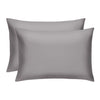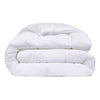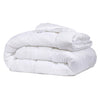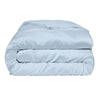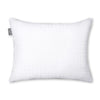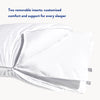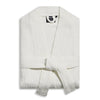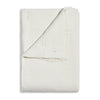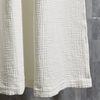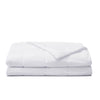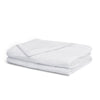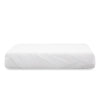The Daily Miracle
Fabric Softener vs. Detergent: What's the Difference?
Published
August 16, 2022
Author
Suze Dowling

Doing laundry feels like second nature; you probably don't even think twice before starting a load.
You might have caught yourself staring at your fabric softener and detergent and wondering why you need both. If so, then you're in the right place!
We're going to spend the next few minutes explaining the differences between the two. Perhaps this newfound knowledge will help keep your garments in even better shape than before!
Fabric Softener 101
Let's first talk about fabric softener. Fabric softener is useful because it gives all your fabrics that soft touch. Sure, fabrics like satin are naturally super soft, but you can’t wear them all the time. Fabric softener broadens your choice of materials, making them all luxuriously soft.
Fabric softener smells delicious and leaves your clothes ultra-soft, but what's the difference between detergent and softener, and why have you spent your whole life using both?
To put it simply, fabric softener isn't a cleaning solution and must be paired with detergent to get your fabrics properly washed. Fabric softener will leave your clothes feeling and smelling just right, but that doesn't mean that it removes dirt and grime.
How Does Fabric Softener Work?
Think of your fabrics as your hair and the fabric softener as the conditioner.
A typical fabric softening liquid is full of lubricating chemicals that reduce friction and static cling, making your clothes feel softer than when washed with detergent alone. Plus, fabric softener gives your laundry a distinctly comforting scent. Chances are, if you've washed a load or two without a softener, you could smell the difference.
Why Should You Use Fabric Softener?
Not only does fabric softener promote softer and better-smelling fabrics, but it can also extend the lifespan of your garments.
Due to its protective properties, fabric softener can be a sort of backup for your detergent. Softener helps protect and strengthen fabrics by reducing wear during the washing process. The more you use fabric softener, the longer your fabrics will keep their desired feel.
Since fabric softener doesn't precisely wash your clothes, it might seem unnecessary at times, but sometimes the little things can make a big difference.
When To Skip the Fabric Softener
For the most part, you can use fabric softeners with almost any material. However, they're traditionally formulated for use with cotton and linen. That means there are some fabric types that shouldn't be washed with fabric softeners.
Here are a few fabrics that can do without the softener:
- Microfiber
- Moisture-wicking fabrics (workout clothing)
- Fleece, velour, and terry cloth
- Towels (sometimes) — we suggest alternating washes. Softener won't harm your towels but may make them less absorbent.
These few fabrics won't get the same benefits from fabric softener, so we say it’s best to skip it altogether.
Important Notes
Now that you understand the ins and outs of fabric softener, here are the key takeaways:
- Avoid use with certain fabrics.
- Fabric softener is not a cleaning solution!
- Fabric softener can help fabrics last longer.
Laundry Detergent 101
Remember how we compared fabric softener to conditioner? Let's think of detergent as your shampoo. Shampoo and conditioner work together — using only conditioner could leave your oily or downright dirty. The same rule applies to your laundry.
The detergent is the cleaning solution in the washing cycle, whereas the fabric softener is simply the lubricant and the product that provides that fresh scent.
How Does Detergent Work?
Nowadays, there are all types of laundry detergents. You might prefer natural over synthetic or detergent sheets over liquid detergent. Whatever the case, chances are you have your go-to brand, scent, and size that seldom changes.
While detergent started as bar soaps made of animal fat and lye, it’s certainly evolved over time. Still, the objective of using detergent has remained the same: get as much dirt, grime, and grease off your laundry as possible.
We're going to take a trip back in time to 5th-grade science class and break down exactly how your detergent gets your laundry clean:
- All soaps and detergents are made the same way (and from the same long molecules) called surfactants. These molecules consist of a head and a tail.
- The cleaning process happens like this: the head of the molecule attaches to the water, and the tail attaches to the dirt on the fabric.
- When the tail meets the grease, it draws water from the head, causing the soap to sud. The attractive force slowly draws the grime out of the fabric.
When To Skip Laundry Detergent
Unlike fabric softeners, you should never skip your detergent.
If you choose to wash a load without fabric softener, the laundry will still get washed properly; it just won't be as soft. However, if you skip your detergent, the softener alone won't get any dirt or bacteria out of your fabrics.
Fabric softener is an important part of the wash cycle — but not as important as the detergent. Detergent is the key to clean clothes — which is why you should always use the best and safest detergent you can find.
Opt for Natural Detergents
Today's laundry detergent looks (and smells) much different than when it first took form in the early 1900s.
Laundry detergents today will give your fabric a much more thorough wash. However, they're also thought to be much worse for your skin and overall health. Concerns arise due to their intense chemicals and additives like fragrances, endocrine disruptors, and neurotoxins. This is why opting for an all-natural and eco-friendly detergent is suggested.
How Can You Care for Your Fabrics?
If you've taken the time to read this whole article, chances are you prioritize caring for your fabrics. That’s why we have a few more tips for you to follow when caring for your towels, bedding collection, and clothing.
Wash Less Often
Keeping your laundry clean is so important, but washing them too often can damage the materials. So, as a rule, try not to wash your fabrics too often.
If you choose a bedding collection made with antimicrobial silver, you can do laundry three times less often than other bedding. Natural silver helps bedding stay cleaner longer; it prevents 99.9% of bacteria growth, fights odor, and helps reduce night sweats.
Avoid Washing With Hot Water
If you really want to sanitize a piece of fabric, hot water is what you need. However, for the majority of the time, you want to stick to cold water only. Hot water can put unwanted wear and tear on your fabric and shorten its lifespan.
Air Dry When You Can
Obviously, using a dryer is convenient and totally fine most of the time. However, if your goal is to keep your fabric quality as long as possible, try to air dry when you can.
Soft Fabrics for Everyone
Laundry detergent is a step you should never skip, and fabric softener plays a key role in maintaining your fabric's quality and feel. Both are super important parts of your laundry's wash cycle.
For the best results, we suggest keeping them both in your regular laundry routine. Preserving your fabrics’ lifespan can be tricky, which is why using products like fabric softener is such a helpful idea —- it makes your job easier while giving your clothes that feel-good smell.


